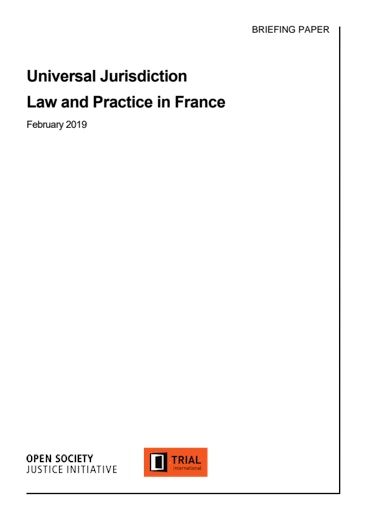Paris Court Accepts Appeal on French Police Ethnic Profiling Case
NEW YORK—Efforts to end discriminatory police stops by French police won a significant legal victory in the French courts today, as a Paris appeals court sided with five young men of Arab and African descent who argued that they had been singled out for police stops because of the way they look.
In a historic ruling, the Paris Court of Appeal found that discriminatory identity checks are illegal, even when conducted politely. The Court of Appeal found a violation in five of the thirteen cases on appeal. The court highlights that the French state is obliged to take all necessary measures to prevent discrimination, an obligation it has failed to fulfill. It also found that the lack of any record of identity checks places victims in a position where they are unable to obtain effective recourse in cases of discrimination or abuse. The court emphasized its role to ensure checks carried out are based on objective grounds rather than on the basis of racial or ethnic grounds.
The ruling overturned the findings of the Tribunal de Grande Instance de Paris in October 2013, which had accepted the government’s argument that the applicants had failed to show that what had happened to them was deliberate discrimination by the police. The lower court had also concluded that it is not its role to ensure that the regulations covering police stops (article 78 § 2 of the Code of Criminal Procedure) contain sufficient procedural guarantees to ensure that they are applied in a manner that respects fundamental rights.
Now, the French State will need to modify the legal framework regulating identity checks to ensure that checks may only be carried out based on objective and individual grounds; individuals checked must also be provided with a record of the check stating on what grounds it occurred.
In total there were 13 applicants, all of Arab or African descent, who were stopped while carrying out routine activities. None of the checks resulted in any legal action against the individuals, such as tickets or fines. Despite victory in five of the thirteen cases, the eight negative decisions raise serious concerns.
The court found no violation in cases that took place in poor suburbs, despite the absence of objective grounds for the stops. The court explicitly says the claimants’ behavior would not be suspicious in other locations, but in “dangerous” locations, the opposite is true.
The Open Society Justice Initiative has provided legal support to the case, brought by lawyers Slim Ben Achour and Felix de Belloy. The case was first filed in April 2012.
“We welcome this historic decision by the court to help end the everyday discrimination in France carried out through the widespread practice of ethnic profiling,” commented James A. Goldston, executive director of the Open Society Justice Initiative. “It is worrying, however, that the court’s judgment deems acceptable a two-track system of justice, one for poor suburbs and another for elsewhere; everyone in France deserves equal treatment by the police, including those who live in poorer areas.”
This ruling also places an excessive burden on any individuals checked to provide proof of a discriminatory motive; this fails to fully apply the nondiscrimination standards that the court otherwise recognized in the ruling.
France’s human rights ombudsman, the Defenseur des Droits, issued a legal opinion in support of the applicants. It highlights that governments not only have an obligation not to discriminate, but must also take steps to prevent and end discrimination. It also stresses that the lack of any record of identity checks prevents those checked from challenging the legality of the police action.
The applicants argued, among other things, that the court ruling is at odds with European antidiscrimination law, which places the burden of proof on the state to prove that no discrimination occurred, rather than on the victim. They also stressed that the court has ignored the basic legal principle that international, European, and constitutional laws are superior to France’s Administrative Code on the Organization of the Judicial System, which the court applied in its ruling.
A quantitative study by the Justice Initiative and the French National Research Institute (CNRS), carried out in Paris in 2009, demonstrated that individuals identified as “Blacks” and “North Africans” are checked respectively six and eight times more than “Whites.”
Lawyers for the applicants said that this decision will compel the highest authorities in France, including the Ministry of Justice, to take measures to safeguard the fundamental rights of millions of people in France and finally put an end to the practice of police checks.
The Justice Initiative is also supporting a separate legal challenge to the relevant police regulations before the French Council of State (Conseil d’État), the highest administrative court.
The Justice Initiative has supported groundbreaking research in several European countries on the extent and costs of ethnic profiling. We also brought the landmark Rosalind Williams v. Spain case before the UN Human Rights Committee, which marked the first time that an international tribunal ruled that ethnic profiling violated international human rights.
###
The Open Society Foundations work to build vibrant and tolerant democracies whose governments are accountable to their citizens. Working with local communities in more than 100 countries, the Open Society Foundations support justice and human rights, freedom of expression, and access to public health and education.
Related Work
Amid COVID-19 Lockdown, Justice Initiative Calls for End to Excessive Police Checks in France
The Open Society Justice Initiative has called on the French government to ensure that police checks carried out during COVID-19 do not use excessive, violent, or discriminatory force.
Building Roads to Justice in Syria
The Open Society Justice Initiative is part of a broad movement of Syrian and international groups that are bringing some of those responsible for atrocity crimes in Syria before courts in Europe.

Universal Jurisdiction Law and Practice in France
The principle of universal jurisdiction allows national courts to investigate and prosecute international crimes committed on foreign territory by foreign nationals. This briefing paper provides an overview of France's legal framework on universal jurisdiction and was produced in partnership with TRIAL International.
